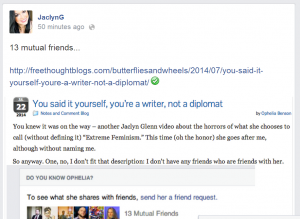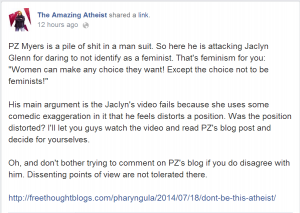A pretty story from Afghanistan:
It was bad enough that the alleged rape took place in the sanctity of a mosque, and that the accused man was a mullah who invoked the familiar defense that it had been consensual sex.
But the victim was only 10 years old. And there was more: The authorities said her family members openly planned to carry out an “honor killing” in the case — against the young girl. The mullah offered to marry his victim instead.
Just gorgeous, isn’t it? The mullah said it was consensual – when the girl he raped was ten years old. And he’s a mullah. In a mosque.
Plus the bit about her family’s plans to kill her.
And it gets even more wonderful, because she was in a shelter, but this week the police took her out of the shelter and gave her back to her family – so that they could kill her easily, I guess.
The head of the Women for Afghan Women shelter here where the girl took refuge, Dr. Hassina Sarwari, was at one point driven into hiding by death threats from the girl’s family and other mullahs, who sought to play down the crime by arguing the girl was much older than 10. One militia commander sent Dr. Sarwari threatening texts and an ultimatum to return the girl to her family. The doctor said she now wanted to flee Afghanistan.
The head of the women’s affairs office in Kunduz, Nederah Geyah, who actively campaigned to have the young girl protected from her family and the mullah prosecuted, resigned on May 21 and moved to another part of the country.
The case itself would just be an aberrant atrocity, except that the resulting support for the mullah, and for the girl’s family and its honor killing plans, have become emblematic of a broader failure to help Afghan women who have been victims of violence.
Support for the mullah. How does that even work? Even in their terms? Why would anyone support the man while at the same time supporting the family’s plan to kill the girl? Are they thinking the girl raped the mullah?
Most of the anger in Kunduz has been focused not on the mullah but on the women’s activists and the shelter, which is one of seven operated across Afghanistan by Women for Afghan Women, an Afghan-run charity that is heavily dependent on American aid, from both government and private donors.
So…the raped girl is a kind of American by proxy, and that’s why they support the mullah?
Yes but then there’s that hole he punched in the wall of her vagina.
The accused mullah, Mohammad Amin, was arrested and confessed to having sex with the girl after Quran recitation classes at the mosque on May 1, but claimed that he thought the girl was older and that she responded to his advances.
The girl’s own testimony, and medical evidence, supported a rape so violent that it caused a fistula, or a break in the wall between the vagina and rectum, according to the police and the official bill of indictment. She bled so profusely after the attack that she was at one point in danger of losing her life because of a delay in getting medical care.
After the two women’s officials began speaking out about the case, they started receiving threatening calls from mullahs — some of them Taliban, others on the government side — and from arbakai, or pro-government militiamen. One of their claims was that the girl was actually 17, and thus of marriageable age, not 10.
And that fistula was totally consensual and legitimate.
Photographs of the girl that Dr. Sarwari took in the hospital clearly show a pre-pubescent child, and the doctor said the girl weighed only 40 pounds. Few Afghans have birth records, and many do not know their precise ages. But the girl’s mother said she was 10, and a forensic examination in the hospital agreed, saying she had not yet started menstruating or developing secondary sexual characteristics.
Well…maybe the mullah doesn’t see very well.
In the hospital room, the doctor found the girl’s mother holding her child’s hand, and both were weeping. “My daughter, may dust and soil protect you now,” Dr. Sarwari quoted the mother as saying. “We will make you a bed of dust and soil. We will send you to the cemetery where you will be safe.”
Even mothers here often believe that there is no choice but to kill rape victims, who are seen as unmarriageable and therefore a lifelong burden to their families, as well as a constant reminder of dishonor. “Their men feel they have to wash their shame with blood,” Dr. Sarwari said.
And last Tuesday she went back to them. She’s probably dead now – in her bed of dust and soil, safe in the cemetery.
(This is a syndicated post. Read the original at FreeThoughtBlogs.)





